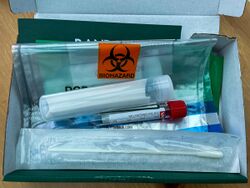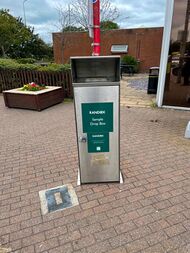Randox Health
Topic: Company
 From HandWiki - Reading time: 6 min
From HandWiki - Reading time: 6 min
| Type | Private limited company |
|---|---|
| Founded | 1982 |
| Founder | Peter FitzGerald |
| Headquarters | Crumlin, County Antrim and Moorgate , |
Number of locations | 145 countries |
Key people | Robert Ivan McConnel (Co-owner) Richard Kelly (Co-owner) David Ferguson (Managing Director) |
| Revenue | |
| Total assets | |
| Website | www |
Randox Health also known as Randox Laboratories or Randox Toxicology/Randox Food Diagnostics or simply Randox, is an international health and toxicology company in the in vitro diagnostics industry headquartered in the United Kingdom . The world's first biochip array technology developer, the company develops diagnostic solutions for hospitals, clinical, research and molecular labs, food testing, forensic toxicology, veterinary labs and life sciences. It develops, manufactures and markets reagents and equipment for laboratory medicine, with a distribution network of 145 countries. Randox is the biggest polymerase chain reaction testing provider in the UK and Ireland.[2][3][4][5] Randox received three contracts by the Department of Health and Social Care without having to compete for a tender.
In 2020, Randox was awarded nearly £500 million by the UK government to provide private-sector COVID-19 testing at the cost of about £49 per kit.[6] The company has signed a two-year deal with the British Olympic Association to test the British Team for COVID-19.
It is the official sponsor of the Randox Health Grand National from 2017.
Company profile
Randox was established in 1982 by Peter FitzGerald in Crumlin, Northern Ireland, and has since expanded globally.[7]
Randox is one of the top 25 IVD companies globally. Randox claims to manufacture more clinical diagnostic products than any other company in the world[citation needed]. It invests around 25% of profits into R&D, and almost a quarter of its staff are research scientists and engineers.[8]
Following the development of Randox Health, the first public facing division, the company became the title sponsor of the Randox Health Grand National.
Research and development
Beginning with a team of six employees, the company now has 2,500 employees around the world. It moved into the Randox Science Park, a 45-acre R&D and manufacturing site housed on the former Massereene Barracks in 2019.
It has also recently[when?] invested €25 million in developing a site in Dungloe, Donegal. Randox Teoranta aims to create more than 470 jobs in research, engineering and life sciences by 2020.[citation needed]
Randox's range of reagents covers many different techniques such as colorimetric, UV and immunoturbidimetric methods. As a result of heavy investment in R&D, Randox's portfolio has grown to provide a wider variety of reagents.[citation needed]
Products
Biochip array technology
Randox developed the world's first biochip array technology (BAT) in 2002. BAT is a multi-analyte testing platform which allows simultaneous quantitative or qualitative detection of a wide range of analytes from a single patient sample. It screens biological samples in a rapid, accurate and easy-to-use format. £180 million was invested in research and development of BAT.[citation needed]
With the development of the biochip, analysers were created to handle the biochip in a high throughput routine laboratory. The analyser range expanded from the evidence, to include the evidence evolution, evidence investigator and evidence multistat.[9]
Clinical chemistry analysers
Randox's range of clinical chemistry analysers, the RX Series, accommodates low- to high-throughput laboratories. The RX monza, RX daytona, RX daytona plus, RX imola, RX Monaco and RX suzuka are marketed as 'An attempt to consolidate a laboratory's requirements onto one platform'. The throughput of the range varies, with the RX monza having the capability of up to 10,000 tests per year and the RX suzuka having up to 1,000,000 tests per year.[10][11][12]
Quality control
Randox claims to be the third-largest health manufacturer of quality controls and calibrators in the world.[citation needed] It specialises in third-party controls that combine many analytes into a single control with the aim of consolidation. Covering over 390 parameters, the Acusera-branded portfolio of QC products supplies 1,000 customers worldwide with QC material. Principal control products include clinical chemistry, immunoassay, urine, cardiac, as well as numerous other research based areas.[13]
Acusera 24.7 Live Online is an inter-laboratory data management program, with the purpose of supporting the Acusera range of controls.[13][14]
RIQAS
Randox International Quality Assessment Scheme (RIQAS) is the external quality assessment (EQA) scheme supplied by Randox. RIQAS is the largest international EQA scheme with more than 60,000 laboratory participants in over 123 countries. There are currently 32 programmes available spanning most areas of clinical testing.[15] RIQAS is also ISO 13485 and UKAS accredited.[16][17]
Controversies
Discrimination towards employees
Several legal actions were taken by man employees against the company. An employee filed a lawsuit against Randox after being discriminated against because of his weight.[18] In addition, its former international business manager was also fired because after being praised for his efforts in India and for a presentation on the business plan for Randox. The tribunal awarded him over £70,000 for Randox's unfair dismissal.[19]
With the support of Unite legal services, a female Randox employee sued Randox after a dispute over maternity pay. The court favoured the employee and granted her compensation.[20]
In March 2019 it was reported that former cabinet minister and Conservative MP Owen Paterson, who was a consultant to Randox, had helped to lobby the government to seek contracts for them. This violates rules stating that an MP may not lobby on behalf of a paying client.[21]
In May 2020, the company was awarded a £133 million contract by The Department of Health and Social Care (DHSC) without having to compete for a tender. When asked if Paterson had lobbied on behalf of the company a spokesman for DHSC said they were "unable to comment on the personnel matters of other organisations".[22]
On 7 August 2020, the United Kingdom Medicines and Healthcare Products Regulatory Agency requested Randox to recall the Randox COVID-19 Home Testing Kit due to safety concerns in a measure it described as precautionary.[23]
On 4 November 2020, the UK awarded a 6-month extension of the original contract for £347 million in COVID-19 testing without a public tender.[6] On 16 November, Channel 4's Dispatches said that Randox were managing test processing facilities in a manner which could lead to people not receiving test results, cross contamination through the leaking of test results, and workers facing unsafe conditions;[24] however, Randox denies these claims.[25]
Data tampering
In February 2017, two Randox employees were arrested on suspicion of perverting the course of justice amid allegations of data tampering within Randox Testing Services, used by many Police Forces in England and Wales for forensic toxicology. Randox acquired this laboratory in Manchester from Trimega laboratories which went into administration in 2014.[26] As of November 2017, around 50 criminal prosecutions for driving offences had been dropped in what BBC home affairs correspondent, Danny Shaw, described as "the biggest forensic science scandal in the UK for decades".[27] Police forces have begun reviewing over 10,000 criminal cases that may be affected by the alleged data manipulation, including sexual and violent crimes.[28]
Language Policy
In April 2021, Randox posted notices in its Donegal Gaeltacht facility forbidding employees from speaking any language other than English in the workplace. The company receives significant funding from Údarás na Gaeltachta, which is charged with industrial development in Irish-speaking areas. When challenged, the company withdrew the notices, but the matter received significant attention in the Irish media.[29]
See also
- International Trade Awards (2007) Randox Laboratories
Notes and references
- ↑ "Randox: Healthcare diagnostics group returns to profit". BBC News. 8 October 2019. https://www.bbc.com/news/uk-northern-ireland-49965336. Retrieved 30 June 2020.
- ↑ 18 March 2011 – Foster announces 242 new jobs at Randox Laboratories | Northern Ireland Executive. Northernireland.gov.uk (18 March 2011).
- ↑ Proteome Sciences Licenses Stroke Biomarkers to Randox . IVD Technology (5 April 2012).
- ↑ "Randox launches COVID-19 testing lab at Heathrow Airport". 27 January 2021. https://www.randox.com/heathrow-airport-covid19/.
- ↑ "Randox agrees a deal to test Team GB for Olympics". Belfasttelegraph. https://www.belfasttelegraph.co.uk/business/northern-ireland/randox-agrees-a-deal-to-test-team-gb-forolympics-40539135.html.
- ↑ 6.0 6.1 Garside, Juliette; Smith, Joseph (4 November 2020). "Tory-linked firm involved in testing failure given new £347m Covid contract". The Guardian. https://www.theguardian.com/world/2020/nov/04/tory-linked-firm-involved-in-testing-failure-awarded-new-347m-covid-contract.
- ↑ The Friday Interview – Peter Fitz-Gerald, Randox Laboratories – IDA Ireland Investment Promotion Agency . Idaireland.com.
- ↑ Randox Laboratories: the future of healthcare – Personal Care Magazine[|permanent dead link|dead link}}]. Pathologyinpractice.com.
- ↑ Randox Laboratories. Randox.com.
- ↑ "Archived copy". Archived from the original on 3 April 2011. https://web.archive.org/web/20110403062543/http://www.ngpharma.eu.com/article/Randox-Laboratories-Ltd--from-bench-to-bedside/. Retrieved 2009-09-22.
- ↑ Clinical Chemistry Analysers – RX series – Randox Laboratories. Randox.com.
- ↑ Randox Laboratories. Randox.com.
- ↑ 13.0 13.1 Interlaboratory Data Management – QC Software – Acusera 24.7 – Randox Laboratories . Randox.com.
- ↑ Randox Laboratories. Randox.com.
- ↑ EQA schemes – RIQAS – Largest Global EQA Providers – Randox Laboratories. Randox.com.
- ↑ EQA/Proficiency Testing Scheme- EQA- Proficiency Testing . RIQAS.
- ↑ http://www.ukas.org/AccredationOthers/schedules/0010Proficiency%20Testing%20Single.pdf [bare URL]
- ↑ http://www.bbc.co.uk/news/uk-northern-ireland-31360757)
- ↑ "Tribunal criticises Randox over unfair dismissal". BBC News. 9 May 2012. http://www.bbc.co.uk/news/uk-northern-ireland-18006222.
- ↑ http://www.thompsonstradeunionlaw.co.uk/news/unite-legal-services-maternity-pay.html
- ↑ Evans, Robb; Pegg, David; Lawrence, Felicity (8 April 2019). "MP Owen Paterson lobbied government for firm he worked for". The Guardian. https://www.theguardian.com/politics/2019/apr/07/mp-owen-paterson-lobbied-government-for-firm-he-worked-for. Retrieved 3 September 2019.
- ↑ Neate, Rupert; Garside, Juliette; Lawrence, Felicity; Evans, Rob (2020-05-11). "Healthcare firm advised by Owen Paterson won £133m coronavirus testing contract unopposed" (in en-GB). The Guardian. ISSN 0261-3077. https://www.theguardian.com/world/2020/may/11/healthcare-firm-advised-by-owen-paterson-won-133m-coronavirus-testing-contract-unopposed.
- ↑ United Kingdom Department of Health and Social Care (7 August 2020). "Update on Randox test kits". https://www.gov.uk/government/news/update-on-randox-test-kits--2.
- ↑ "Dispatches uncovers serious failings at one of UK's largest COVID-Testing Labs". Dispatches. Channel 4. 16 November 2020. https://www.channel4.com/press/news/dispatches-uncovers-serious-failings-one-uks-largest-covid-testing-labs.
- ↑ Halliday, Gillian; Cross, Gareth (17 November 2020). "Covid testing firm Randox denies Channel 4 'serious failings' claims after undercover probe". Belfast Telegraph. https://www.belfasttelegraph.co.uk/news/health/coronavirus/covid-testing-firm-randox-denies-channel-4-serious-failings-claims-after-undercover-probe-39756018.html.
- ↑ "Randox expands toxicology service by buying Manchester lab" (in en-GB). BBC News. 2014-05-01. https://www.bbc.co.uk/news/uk-northern-ireland-27238803.
- ↑ "Killer drug-drivers' conviction quash bid" (in en-GB). BBC News. 2017-11-22. https://www.bbc.com/news/uk-england-manchester-42081900.
- ↑ Devlin, Hannah; Dodd, Vikram (2017-11-21). "Police review 10,000 cases in forensics data 'manipulation' inquiry" (in en). https://www.theguardian.com/uk-news/2017/nov/21/forensics-data-manipulation-may-have-affected-10000-cases.
- ↑ . https://tuairisc.ie/english-must-be-spoken-at-all-times-failure-to-do-so-is-unacceptable-polasai-teanga-comhlacht-gaeltachta/.
 KSF
KSF

